Do you ever find yourself wondering, ‘Why does my cat sleep on my chest?’
One of our feline friends’ most endearing habits is their tendency to curl up and snooze on top of us (even if we’ve provided them with the best cat beds).
Understanding cat behavior isn’t always straightforward, so you may be finding it difficult to determine why your kitty is napping on you. That’s why we asked Debbie Bryon, a certified clinical animal behaviorist and registered vet nurse, to reveal the reasons for this delightful but peculiar behavior. She has over 20 years experience living and working with cats.
And if you’re also pondering, ‘Why does my cat lay on my chest?’, it may surprise you to discover that the motivation for these behaviors may be different. We also investigate the advantages and disadvantages of having a cat sleep on our bed.
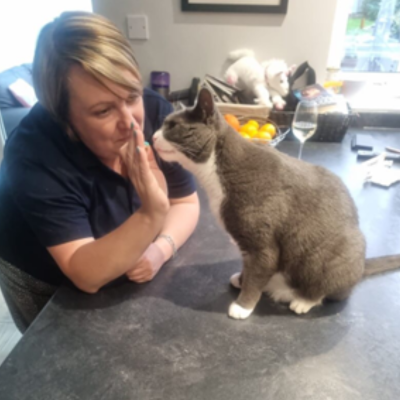
Debbie Bryon is a certified clinical animal behaviorist, animal training instructor, and registered vet nurse with over 20 years experience working with cats, dogs, rabbits, rodents, and a range of other species. Debbie holds a BSc in Veterinary Nursing Science, the Nurse Certificate in Animal Behavior, and a Postgraduate Diploma in Clinical Animal Behavior. She is an accredited member of the Fellowship of Animal Behavior Clinicians and the Association of Pet Behavior Counsellors, and is listed on the Animal Behavior and Training Council register. Debbie is the founder of Positive Pet Behaviour, offering a range of behavioral consultations and training solutions. Using scientific methods and research, she supports guardians to understand why their pets are acting the way they are and what is driving their behavior.
Why does my cat sleep on my chest?
There are many different physical and emotional reasons why your cat may choose to sleep on your chest. Understanding these and determining which applies to your furry friend will help you to meet their needs, maximize their happiness and appreciate your unique bond.
1. Affection
Cats form strong bonds with their human companions and physical closeness is often a clear sign of how to know if your cat loves you.
“Loving cat behavior is more subtle than dogs’ exuberant displays of affection,” says Bryon. “Snuggling up to sleep on your chest is a way for your cat to express their love and demonstrate their trust in you.”
2. Security
When your cat curls up on your chest, it’s not just about finding a comfortable spot for a snooze. They’re also seeking your protection and a sense of security.
Bryon explains that, “As solitary animals, cats are at their most vulnerable when they’re sleeping. In the wild they could be prey for larger predators, so even when they drift off they remain alert to the sounds and smells of potential threats, ready to startle awake and flee at a moment’s notice.”
Nestled in the cozy sanctuary of your chest, they can finally relax, let their guard down and enjoy a peaceful slumber safe in the knowledge that you’re there to watch over them and protect them from danger.
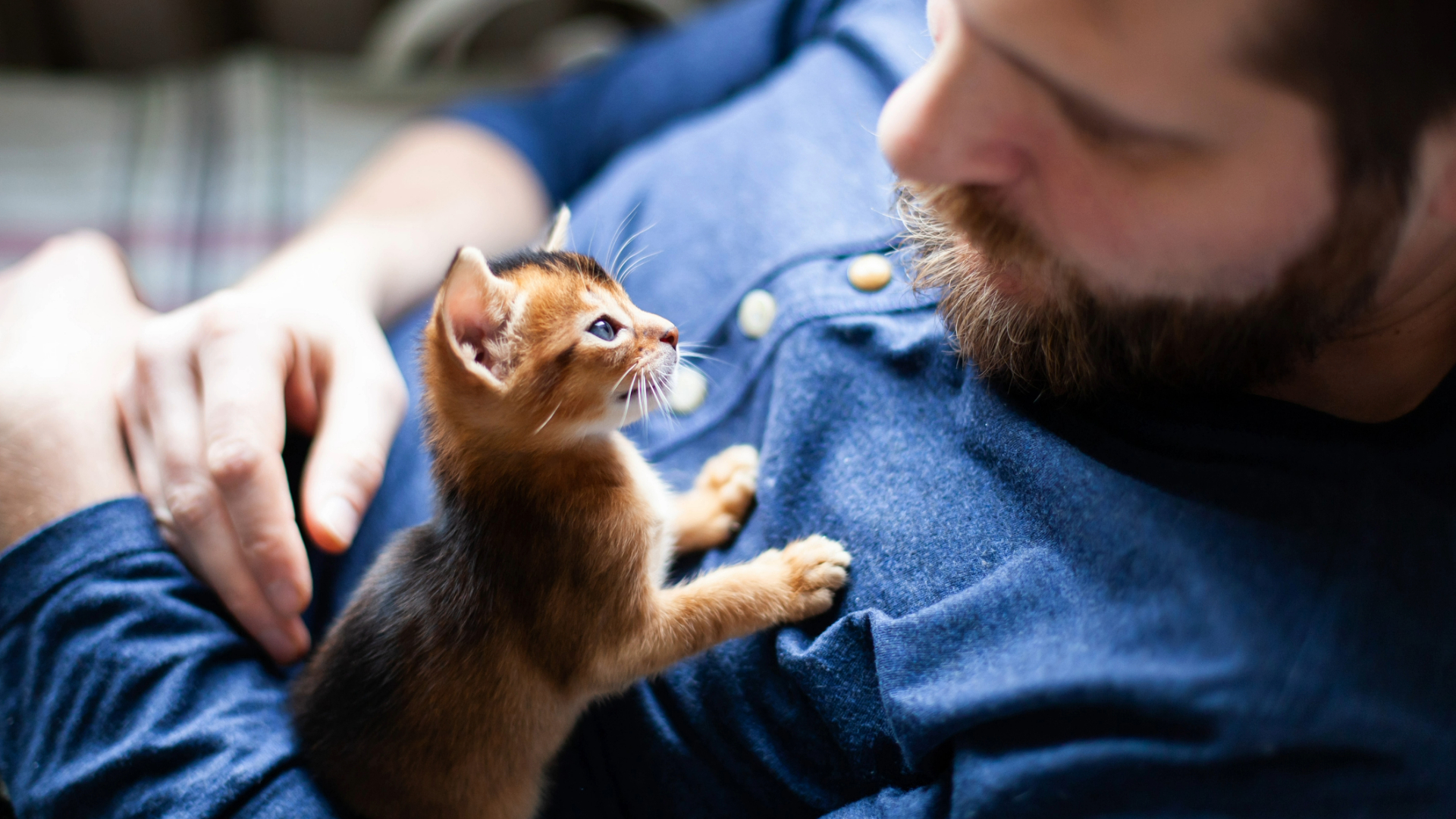
3. Warmth
Domestic cats are descended from the desert-dwelling African wildcat and like their ancestors, they thrive in a consistently warm environment. They seem to have an uncanny ability to locate the hottest place in the house whether that’s a sunbeam on the window sill, a toasty rug in front of the fire, or a pile of laundry fresh from the dryer. But where better to find warmth than on their human’s chest?
The chest radiates heat and is usually covered in soft clothes or tucked under a snug blanket, making it the ideal location if your cat is seeking a comfortable spot to settle down to sleep. Your furry companion may be more likely to snuggle up to sleep on your chest if you live in a cool climate, particularly during the winter months.
Breeds with short, fine coats like Siamese, orientals and hairless breeds like the sphynx are known for their heat-seeking behavior and have a reputation for being particularly keen to cuddle up with their human companions.
Kittens and elderly cats are also more susceptible to cold, so you may find them trying to sleep on your chest. If you find yourself asking why does my cat sleep on my chest, Bryon suggests, “Consider whether they are feeling the cold and would appreciate a heated cat bed.”
4. Scent
Scent plays a crucial role in feline behavior and social interactions. Cats use scent to identify members of their social group, so snuggling up on your chest is an opportunity to bask in your familiar fragrance.
You may notice that your cat head bunts you when they lay down on your chest. “This affectionate behavior deposits pheromones from the glands on their cheeks, forehead, and chin onto your skin and clothes, helping to create a reassuring shared scent and marking you as their human,” explains Bryon.
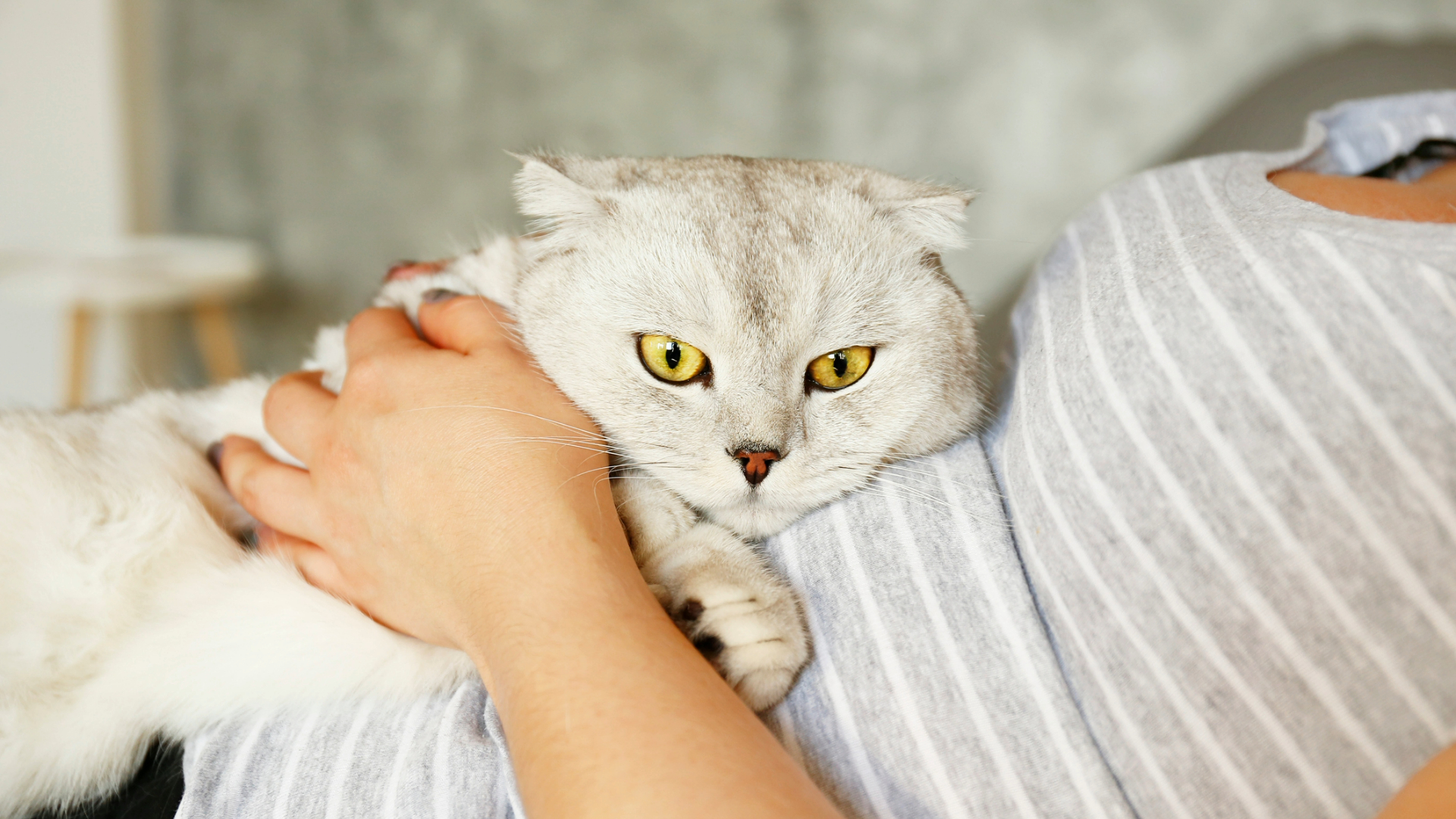
5. Comfort
Sleeping on your chest can give your cat the same sense of comfort and reassurance they experienced when they were a kitten, cuddled up with their mother and siblings.
The soothing sound of your heartbeat and the gentle rise and fall of your chest is reminiscent of their mother’s. You may find your kitty purrs, drools and kneads your clothes or the bedcovers while they slumber.
According to Bryon, “This endearing behavior starts in kittenhood, when suckling kittens knead their paws on their mother, so it’s a sign that they feel closely bonded with their pet parent.”
Why does my cat lay on my chest?
Perhaps you’re also wondering, ‘Why does my cat lay on my chest?’ While laying on your chest can also be attributed to your cat’s desire for companionship and their natural instinct to seek warmth and security, there are some alternative explanations.
Cats naturally gravitate to an elevated perch, so your chest may be an ideal vantage point. Being up off the ground makes felines feel safer, allowing them to observe their core territory and remain out of reach of perceived threats, like dogs or unfamiliar people.
Bryon reveals, “It may also be an attention-seeking behavior, for example, if your cat is hungry or wants to solicit petting or play.”
You may be more likely to consider why does my cat lay on my chest if it’s a new behavior or happening frequently.
“If your cat suddenly starts sleeping or laying on your chest when they’ve never shown any interest before, or if they are doing it more than normal, it could be a sign that they are feeling unwell or anxious,” Bryon cautions, “It’s important to take notice of any change in your cat’s normal routine, as it could indicate an underlying medical problem or that they are stressed due to changes in their home environment. If you have any concerns, speak to your vet.”
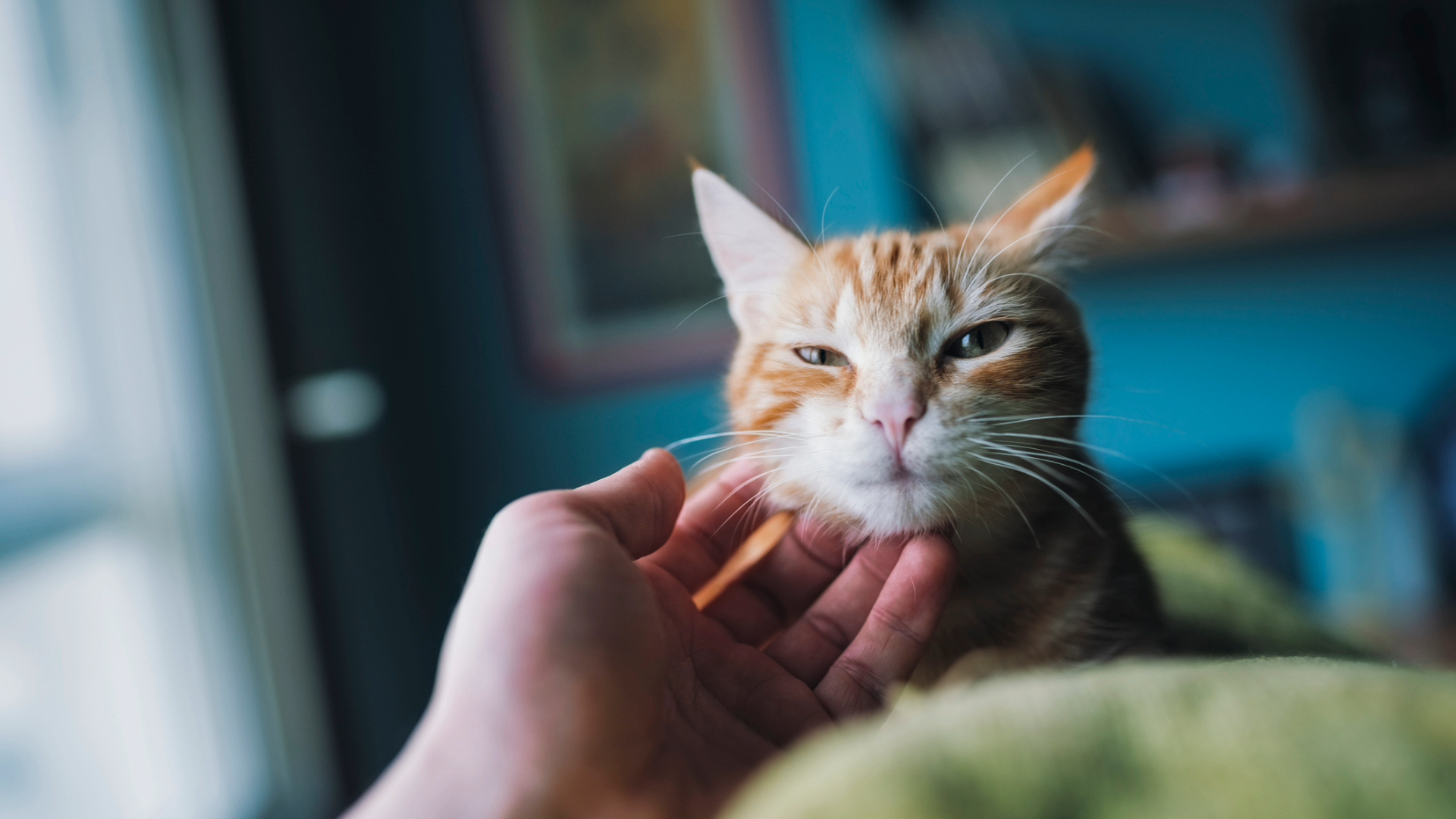
Should I let my cat sleep with me?
Should you let a cat sleep on your bed is an age-old debate. Ultimately, the decision is yours to make depending on what works best for you and your cat. On the positive side, it can foster a strong bond between you, providing you both with companionship and a sense of security.
A cat’s rhythmic purring can act like white noise, masking sounds like passing traffic, promoting relaxation and helping you to drift off to sleep. The pressure of your furry friend sleeping or laying on your chest can also have a calming effect, similar to using a weighted blanket.
A study published in the Pet Behaviour Science journal revealed that the presence of a cat on your chest can reduce your heart rate and blood pressure and the stronger the bond between cat and human, the greater the benefits.
However, there are some potential downsides to consider. Even if you follow the top tips for brushing cats, your feline companion will still shed fur and dander on your bedding, which could be hazardous to your health if you have allergies or suffer from a respiratory illness.
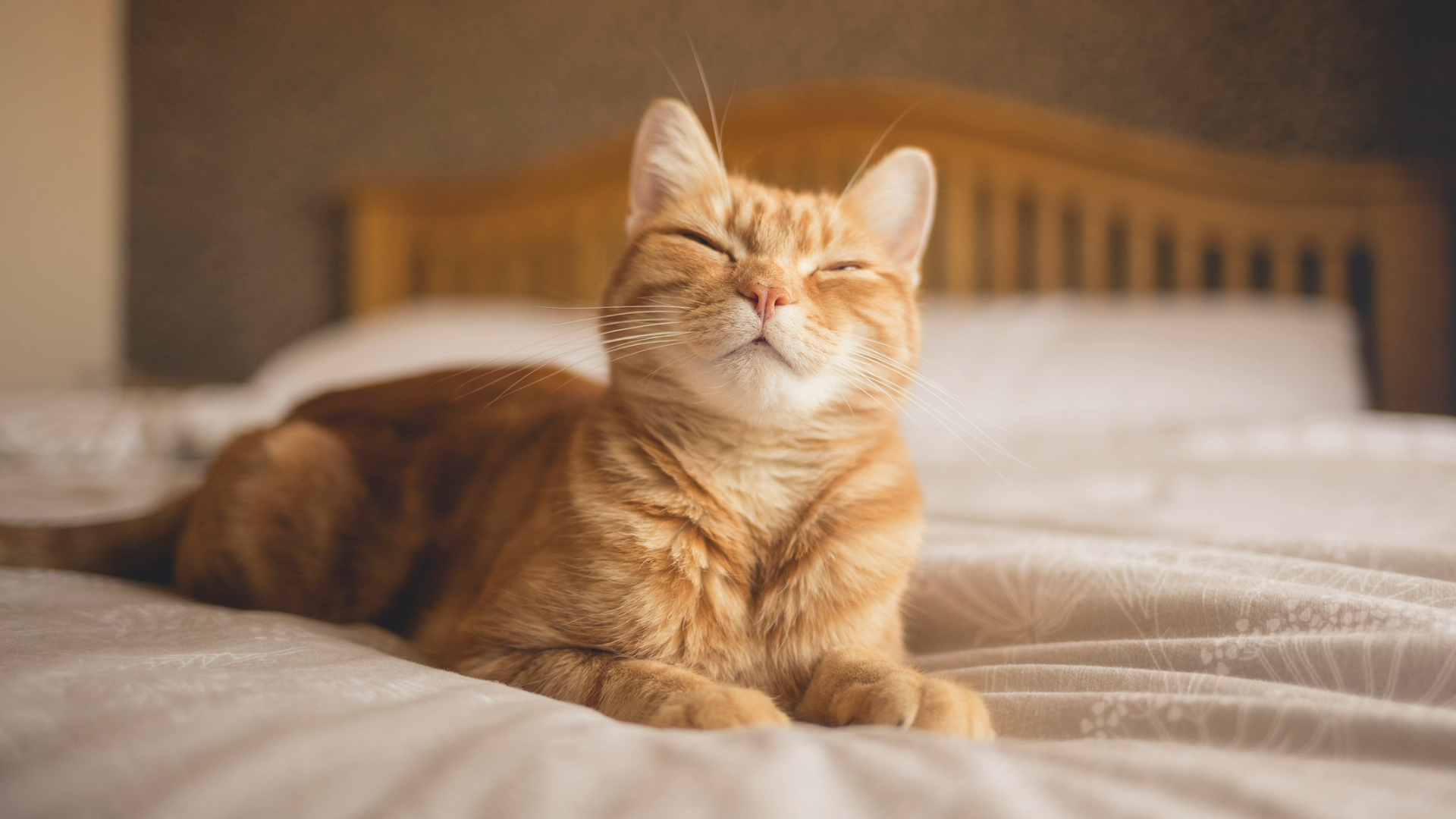
Fleas, ticks and worms can be transmitted from cats to humans, so if you do let your cat sleep with you, keep up-to-date with preventative antiparasitic treatments. If you’re a light sleeper it may be challenging to share a bed with a restless kitty. Cats are crepuscular, meaning that they are most active at dawn and dusk when their prey is most active.
“They are highly motivated to hunt and the movement of your legs under the bed covers may encourage them to pounce on you and bite your feet,” Bryon warns, suggesting, “If your cat is regularly waking you in the early hours, try providing one of the best cat puzzle feeders, to encourage your kitty to engage in pseudo-predatory behavior, leaving you to sleep undisturbed.”
It’s important to remember to respect your cat’s boundaries to avoid them experiencing stress or anxiety.
Bryon advises: “Aim to always allow your cat to choose whether they engage in a particular activity or connection. Cats need to be able to choose to keep themselves physically and emotionally safe. The more you try to force a cat to do something, the less they will choose to engage.
“Always try to perform a consent test, giving two or three little strokes to the cheek or back of the ears. If they lean in, they likely want more. If they lean or even look away, they may not be comfortable with that touch in that moment and if you press on, you may get a swipe or bite as they turn up the volume of their attempted communication with you. Always give them the choice to jump down and never try to force them to lay or sleep on your chest.”
If you’re curious to know why cats need so much shut-eye, check out why do cats sleep so much? You might also be wondering do cats think humans are cats?


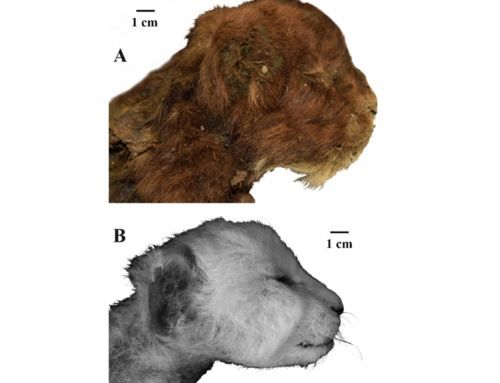

Leave A Comment